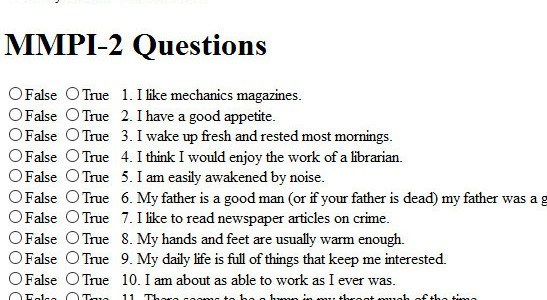

It was replaced by an updated version, the MMPI-2, in 1989 (Butcher, Dahlstrom, Graham, Tellegen, and Kraemmer).

McKinley, faculty of the University of Minnesota, and first published by the University of Minnesota Press in 1943. The original MMPI was developed by Starke R. Psychologists and other mental health professionals use various versions of the MMPI to help develop treatment plans assist with differential diagnosis help answer legal questions (forensic psychology) screen job candidates during the personnel selection process or as part of a therapeutic assessment procedure. However, these tests and assessments don't typically provide results based on science or are considered formal tests.The Minnesota Multiphasic Personality Inventory (MMPI) is a standardized psychometric test of adult personality and psychopathology. Some may be able to provide you with some insight into your personality, and can prove to be enjoyable. Be aware that a large section of the online personality quizzes you are likely to be able to take are for entertainment. There is no need to feel as if you are required to do better than the other person and so, just be honest.ĭo a quick search on the personality assessments out there and you'll be amazed at the number of tests that you can try online. Don't be striving to create a better or more ideal persona. Just give one that best reflects your personality and what you feel.

It lets the therapist collect a considerable amount of information about the test-taker in a short time. In psychotherapy situations the test that is projective is the most popular one of both. Some well-known examples are those of the 16 PF, the Myers-Briggs Type Indicator, and the Minnesota Multiphasic Personality Inventory. Tests that fall under this category comprise a set of questions and answers in the form of ratings that indicate how closely they connect to the statement or question. One of the most well-known examples of a projective test can be that of the Rorschach Inkblot Test. This type of test involves the presentation of a vague scenario or scene for the test-taker to interpret and they are required to provide their opinion on the situation. In general there are two fundamental Personality Quiz For Kids Printable types out there which are explained below: The most well-known examples popular are those of the Minnesota Multiphasic Personality Inventory (MMPI), the Myers-Briggs Type Indicator (MBTI) The Sixteen Personality Factor Questionnaire (16PF) as well as the Big Five theory of personality.

They usually draw on a certain personality system theory, and certain tests have become very popular. Nowadays, there's many different Personality Quiz For Kids Printable.


 0 kommentar(er)
0 kommentar(er)
